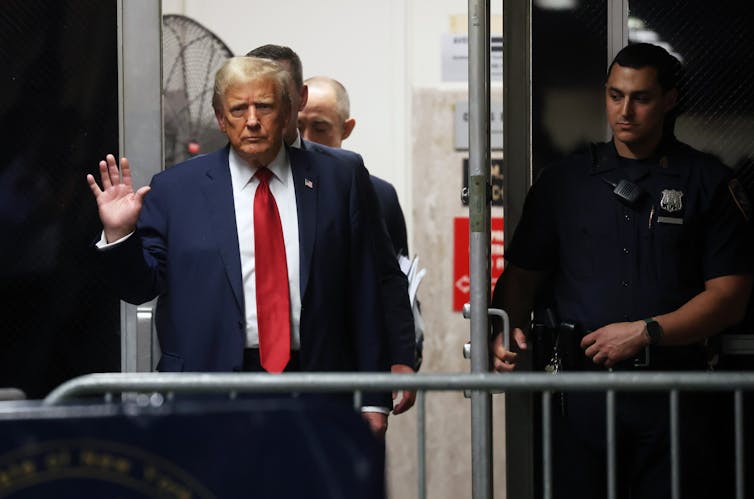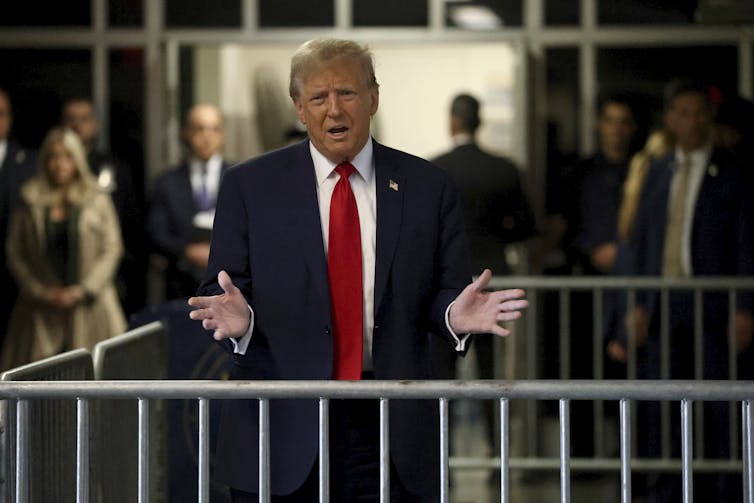
Spencer Platt/Getty Images
Karrin Vasby Anderson, Colorado State University and Tim Bakken, United States Military Academy West Point
The first week of testimony is winding down in former President Donald Trump’s trial in New York City on charges that he falsified business records to cover up hush money payments to an adult film star, in an effort to avoid reporting the payments as campaign-related spending.
In a discussion that quickly shifted to topics well outside the courtroom itself, The Conversation U.S. spoke with Tim Bakken, a former New York prosecutor and now a legal scholar teaching at West Point, and Karrin Vasby Anderson, a scholar of political communication at Colorado State University, about the week’s events.
Their focus this week was on how Trump and other politicians interact with the U.S. media, and how their interactions relate to democracy itself.
Trump’s approach to the media
Anderson: Testimony in the case so far has indicated that Donald Trump thinks that an appropriate way to control or shape the news cycle is to pay off media professionals. That’s a departure from what politicians typically do, which is to hire media strategists who help them shape their message and their political platform in ways that garner favorable media coverage.
Trump’s approach is much more transactional. When he was president, the Columbia Journalism Review noted that he took the “unprecedented move” of revoking press passes from members of the White House press corps who covered him unfavorably.
And some journalists appear to be taking cues from Trump.
Earlier this week, in a Truth Social post, Trump attributed the following quotation to Fox News host Jesse Watters: “They are catching undercover Liberal Activists lying to the Judge in order to get on the Trump jury.” The New York Times found that Trump embellished the quote: The words “in order to get on the Trump Jury” were not in Watters’ initial report.
It’s not surprising that Trump embellished or changed a quotation. What’s really staggering is that after the fact, Watters posted on X the exact statement Trump had made, which was not what Watters had said on air. Essentially, Watters was allowing Trump to be his editor in his coverage and characterization of this case.
Regardless of how the court decides, I think the average American should be concerned that Trump approaches the free press from a transactional perspective. Trump looks to who he can pay off or threaten or intimidate so they will tell the story he wants.
Trump’s reaction to criticism
Bakken: Trump is saying that the media engages in the same kinds of distortions that he engages in when he says, more loudly, things that verge on falsehoods or are falsehoods.
Uri Berliner, a former editor for NPR, essentially raised the same allegations in a recent online column, concluding that NPR’s coverage is swayed by the personal identities and characteristics of its journalists. In essence, according to Berliner, NPR may distort reality, though in a more subtle way than Trump, by virtue of the journalists it hires, the sources who are quoted by the journalists and the stories the editors decide to cover, to the disadvantage of Trump.
Trump seems to be responding to what he perceives as the media, including NPR and The Washington Post, calling him names, such as “authoritarian,” including by characterizing his speech as action.
As a candidate and as a criminal defendant, Trump can point to verifiable facts that signal possible unfairness. For instance, he’s being tried by a jury selected in a jurisdiction where Democrats outnumber Republicans 9 to 1. And the piece about NPR said 87 NPR editors are registered members of the Democratic party and none are Republicans – though at least some are not members of either party.
Maybe he’s saying it’s as great a threat to democracy to be singled out by the democratic institutions – which are supposed to be seeing both sides – because he’s a dissenter or a communicator who is different from other people.
Anderson: The concern that I’m raising with the Jesse Watters case is not that it was friendly towards Trump. It’s that Watters changed his reporting to fit Trump’s narrative after Trump misquoted him.
Trump tweeted something that was a lie: He said “Jesse Watters said ‘XYZ’” and Watters didn’t – Trump added to Watters’ words. That was going to be a problem for Trump because he would have been caught misquoting Watters. So Watters fixed that by going back and matching Trump’s words.
The bottom line is that Trump has shown a willingness in the course of a campaign and presidency to influence the press in ways that other politicians have not.
Trying to get the media to give you a friendly news framing is politics as usual. Paying people with secret deals, or by intimidating or punishing journalists, that’s an entirely different thing. Regardless of whether Trump is convicted of a crime this time around, I do believe that this case is illustrative of his relationship with the media and how he thinks about it differently than other people who’ve been president of the United States.

Jefferson Siegel/The New York Times via AP, Pool
Fighting back
Bakken: In 1996 I ran as a Democratic candidate for Congress in my home district in Wisconsin. I lost in the primary.
I have some experience in trying to convince somebody in the media to write a favorable article by giving a reporter information.
I don’t see how treating a friendly reporter more favorably than you treat an unfriendly reporter is any different. You’re advantaging a journalist who shares your point of view and disadvantaging a journalist who does not share your point of view.
Through deciding what stories to publish, NPR might be doing the same thing that Fox News is doing, except that we didn’t know it until Berliner spoke up. Both internally and publicly, NPR has rejected Berliner’s criticism, but its listeners may have had concerns. Since 2020, the number of weekly NPR listeners plunged from 60 million to 42 million in March 2024, according to The New York Times.
It seems to me that Trump is fighting back against the press in a way that’s more aggressive than other people’s, but he feels that is his only approach. A lot of people align with him because they feel that disconnection from what they believe are institutions that are no longer fair.
A difference from the past
Anderson: My job as I see it, as somebody who is trained in political communication, is not to stump for either side. But I do simply say: When a presidential candidate misquotes a journalist, and then later the journalist posts a second quote that confirms the candidate’s misinformation, that is dangerous, and we should be worried about it. The misquote, by the way, seems to have been influential in one of the jurors stepping down because she was getting bad feedback.
That’s not normal. It isn’t how most politicians, Republican or Democratic, have dealt with the national media prior to Trump.![]()
Karrin Vasby Anderson, Professor of Communication Studies, Colorado State University and Tim Bakken, Professor of Law, United States Military Academy West Point
This article is republished from The Conversation under a Creative Commons license. Read the original article.
















